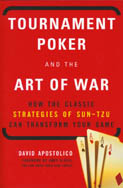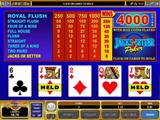
Tournament Poker and The Art of War
by David Apostolico
This is a book about understanding yourself as a player while understanding who you have to face in battle and learning to survive--a key element in no-limit poker tournament play. Risk, deception, exploiting a situation to your own benefit, waiting for the right time to eliminate an opponent, and adjusting your play accordingly are all factors to understand and master.
Read a review of Tournament Poker and The Art of WarTesting you opponents, the power of keen observation, project a strong table image--these areas have been discussed in other books, but rarely with such keen examples, in short powerful bursts of advice.
Play Video Poker at Roxy Palace
If you are looking for the extra edge that goes with knowledge, Roxy Palacel can help you learn what you need.
Can I Throw These Hands Away?
At the 2005 World Series of Poker $2000 Limit Hold'em Event, I went from one of the table chip leaders to having a short stack in a matter of two hands. Let me set the stage. The David Apostolico is the author of 'Machiavellian Poker Strategy', and 'Tournament Poker and The Art of War,' and his latest title 'Poker Strategies for a Winning Edge in Business.' David's website is www.holdemradio.com/blog/ limits were $50-$100 (with $25-$50 blinds). I was on the button and a player in early position open raised for $100. A tight player behind him re-raised for $150 and Barry Greenstein in late position re-raised to make it $200 to go. As there had not been too many pots with multiple raises pre-flop, I was not going to get involved in this hand unless I had a monster. I peek at my cards and, lo and behold, I have two black aces. I was happy to cap the betting at $250. The initial raiser folded (wisely) but the other two players called meaning we would see the flop three way. The flop came 9-8-3 with two hearts. The action was checked to me and I bet out $50. The tight player folded and Barry called me. At this point, I put Barry on another high pair such as Kings or Queens or possibly Ace-King of hearts. The turn brought the Queen of hearts. This was not a card I wanted to see as it could have given Barry a set or a flush. Barry checked, I bet and Barry check-raised me. At this point I knew I was most likely beat but I did think there was a chance Barry had pocket Kings with one of them the King of hearts. So I called. The river brought a blank. Barry bet out and I called. Barry turned over pocket eights giving him a set and I mucked my hand. That hand cost me $600 in chips.
David Apostolico is the author of 'Machiavellian Poker Strategy', and 'Tournament Poker and The Art of War,' and his latest title 'Poker Strategies for a Winning Edge in Business.' David's website is www.holdemradio.com/blog/ limits were $50-$100 (with $25-$50 blinds). I was on the button and a player in early position open raised for $100. A tight player behind him re-raised for $150 and Barry Greenstein in late position re-raised to make it $200 to go. As there had not been too many pots with multiple raises pre-flop, I was not going to get involved in this hand unless I had a monster. I peek at my cards and, lo and behold, I have two black aces. I was happy to cap the betting at $250. The initial raiser folded (wisely) but the other two players called meaning we would see the flop three way. The flop came 9-8-3 with two hearts. The action was checked to me and I bet out $50. The tight player folded and Barry called me. At this point, I put Barry on another high pair such as Kings or Queens or possibly Ace-King of hearts. The turn brought the Queen of hearts. This was not a card I wanted to see as it could have given Barry a set or a flush. Barry checked, I bet and Barry check-raised me. At this point I knew I was most likely beat but I did think there was a chance Barry had pocket Kings with one of them the King of hearts. So I called. The river brought a blank. Barry bet out and I called. Barry turned over pocket eights giving him a set and I mucked my hand. That hand cost me $600 in chips.
 David Apostolico is the author of 'Machiavellian Poker Strategy', and 'Tournament Poker and The Art of War,' and his latest title 'Poker Strategies for a Winning Edge in Business.' David's website is www.holdemradio.com/blog/ limits were $50-$100 (with $25-$50 blinds). I was on the button and a player in early position open raised for $100. A tight player behind him re-raised for $150 and Barry Greenstein in late position re-raised to make it $200 to go. As there had not been too many pots with multiple raises pre-flop, I was not going to get involved in this hand unless I had a monster. I peek at my cards and, lo and behold, I have two black aces. I was happy to cap the betting at $250. The initial raiser folded (wisely) but the other two players called meaning we would see the flop three way. The flop came 9-8-3 with two hearts. The action was checked to me and I bet out $50. The tight player folded and Barry called me. At this point, I put Barry on another high pair such as Kings or Queens or possibly Ace-King of hearts. The turn brought the Queen of hearts. This was not a card I wanted to see as it could have given Barry a set or a flush. Barry checked, I bet and Barry check-raised me. At this point I knew I was most likely beat but I did think there was a chance Barry had pocket Kings with one of them the King of hearts. So I called. The river brought a blank. Barry bet out and I called. Barry turned over pocket eights giving him a set and I mucked my hand. That hand cost me $600 in chips.
David Apostolico is the author of 'Machiavellian Poker Strategy', and 'Tournament Poker and The Art of War,' and his latest title 'Poker Strategies for a Winning Edge in Business.' David's website is www.holdemradio.com/blog/ limits were $50-$100 (with $25-$50 blinds). I was on the button and a player in early position open raised for $100. A tight player behind him re-raised for $150 and Barry Greenstein in late position re-raised to make it $200 to go. As there had not been too many pots with multiple raises pre-flop, I was not going to get involved in this hand unless I had a monster. I peek at my cards and, lo and behold, I have two black aces. I was happy to cap the betting at $250. The initial raiser folded (wisely) but the other two players called meaning we would see the flop three way. The flop came 9-8-3 with two hearts. The action was checked to me and I bet out $50. The tight player folded and Barry called me. At this point, I put Barry on another high pair such as Kings or Queens or possibly Ace-King of hearts. The turn brought the Queen of hearts. This was not a card I wanted to see as it could have given Barry a set or a flush. Barry checked, I bet and Barry check-raised me. At this point I knew I was most likely beat but I did think there was a chance Barry had pocket Kings with one of them the King of hearts. So I called. The river brought a blank. Barry bet out and I called. Barry turned over pocket eights giving him a set and I mucked my hand. That hand cost me $600 in chips. The very next hand I was dealt pocket Kings in the cut off. The player to my immediate right who had been playing very aggressive open raised for $100. I immediately re-raised forcing out the blinds and the aggressive player called me. The flop came 10-6-3 rainbow. My opponent bet and I raised. He called. The turn brought a nine. My opponent checked again and I bet again. My opponent check raised me. I called. The river was a blank. My opponent bet and I called. He turned over 9-10 off suit for two pair. This hand cost me another $450.
Now pocket Aces and Kings are always tough hands to get rid of especially without a pair or over card (in the case of the kings) on board. After I got knocked out of the tournament, I took more than a few minutes to analyze what I could have done differently, if anything. In the first hand with Barry, I think I should have gotten away from the hand when he check-raised me on the turn. The pot was large enough that a check-raise bluff is unlikely to work. It should have been clear to me that he was value betting. Barry had to know that I had a big pair since I had capped the betting and, thus, he knew he was ahead. I easily could have saved myself $200 in chips on that hand if I had folded to his check raise. In a cash game, I am more like to call here. However, in a tournament you have to hold on to your chips when you are beat.
The second hand, however, I believe I played correctly. My opponent in this hand was very aggressive and had a mountain of chips. He had been using those chips to scare people off pots. I had seen him on more than one occasion check-raise with middle pair or less. The range of hands he could have been playing were great and I could not give up my over pair to loose aggressive player with a non-scary board.
The chips you do not lose are as important as the ones you win. Sometimes losing chips is unavoidable but always take the time to reflect on your play to see if you could have done anything differently to hold on to a few more.
[ learn to play poker! ]

